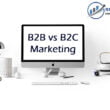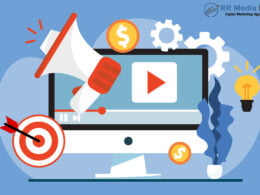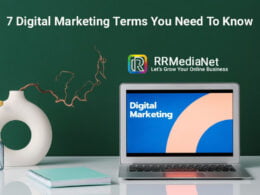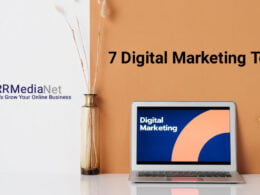B2B vs. B2C marketing – it’s a bit like comparing apples to oranges, right? Well, not exactly. While both are fruits, they each have distinct flavors and purposes. Similarly, B2B (Business to Business) and B2C (Business to Consumer) marketing might seem worlds apart, but they share a common goal: to woo customers. In this not-so-black-and-white world, we’re about to peel away the layers and delve into the core similarities and differences between these marketing giants.
So, if you’ve ever wondered how selling fancy software to corporations differs from convincing consumers to buy the latest smartphone, stick around! We’re about to explore the intricate world of B2B vs. B2C marketing, complete with juicy insights, surprising revelations, and practical tips.
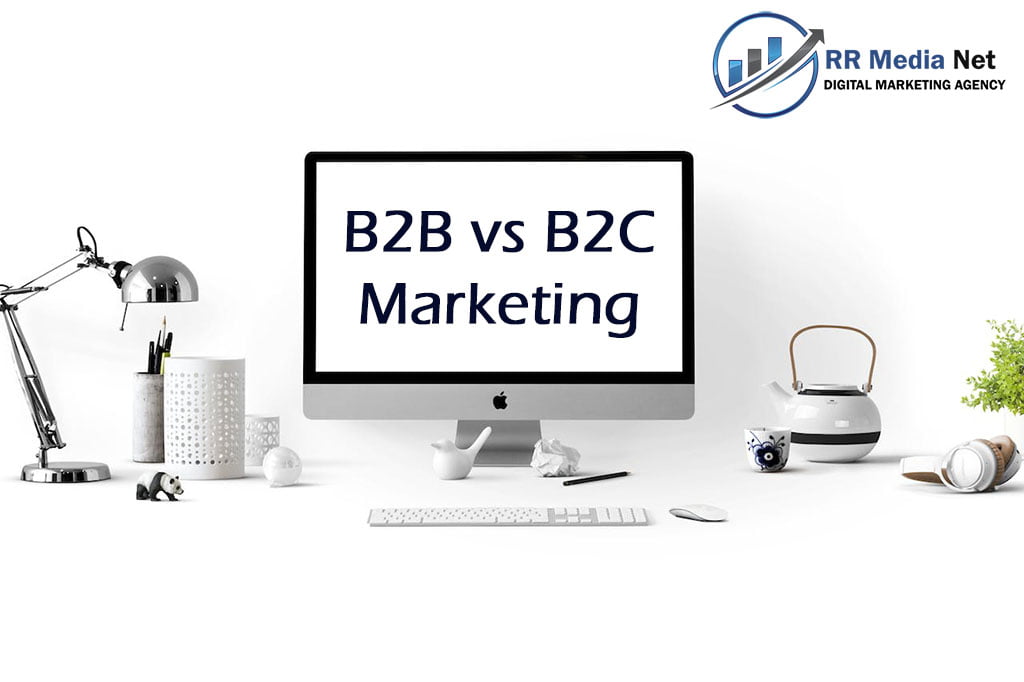
B2B and B2C Marketing
Before we plunge headfirst into the marketing maelstrom, let’s brush up on the basics.
B2B Marketing: Business with a Side of Business
1. The Professional Playground
B2B marketing is like the adult version of marketing. It involves businesses selling their products or services to other businesses. Picture a company selling cutting-edge software to streamline operations in a manufacturing plant. This is the realm of B2B marketing.
2. Relationship Building
In the B2B world, it’s all about nurturing relationships. These relationships are like long-term partnerships. You’re looking to establish trust, reliability, and loyalty. After all, businesses prefer to work with those they know and trust.
3. Longer Sales Cycle
B2B marketing doesn’t rush. The sales cycle can be like waiting for that slow-cooked stew—it takes time. Decisions often involve multiple stakeholders and can take months, even years.
4. Logic Trump Emotion
B2B buyers wear their logical thinking caps. They need to be convinced that your product or service will deliver tangible benefits. Emotional appeals take a back seat.
B2C Marketing: Emotions and Convenience Rule
1. The Consumer Playground
In B2C marketing, you’re in the realm of everyday consumers. Imagine a teenager saving up for months to buy that latest smartphone. That’s B2C marketing in action.
2. Transactional Relationships
B2C is more like speed dating. It’s about quick, efficient interactions. Build a connection, make a sale, and move on.
3. Shorter Sales Cycle
In B2C, decisions are snappy. The sales cycle is like fast food. Consumers decide in seconds, minutes, or at most, days.
4. Emotions Are Key
B2C thrives on emotions. You want your customers to fall in love with your product, crave it, and make impulsive purchases.
Similarities and Differences: The Nitty-Gritty
Alright, now that we’ve got our ABCs down, let’s delve into the heart of the matter and dissect the core similarities and differences between B2B and B2C marketing.
The Similarities
1. Customer-Centric Focus
Whether you’re in B2B or B2C, customers rule the roost. Both strive to meet customer needs and offer value. It’s all about delivering the right solutions at the right time.
2. Content Is King
In both arenas, content marketing reigns supreme. Engaging, informative, and valuable content attracts and retains customers. Blog posts, videos, and infographics are your trusty allies.
3. Social Media’s Power
Social media knows no boundaries. B2B and B2C marketers harness the magic of platforms like Facebook, LinkedIn, and Instagram to connect with their target audience.
4. Email Marketing: Still Kicking
Email marketing remains a potent tool for both B2B and B2C marketers. Crafting compelling emails is a shared endeavor.
5. Data-Driven Decision-Making
Data is the compass guiding both B2B and B2C marketing. Analyzing data helps fine-tune strategies, measure success, and make informed choices.
The Differences
1. Audience and Messaging
In B2B marketing, your audience is composed of professionals and experts. Your message should be technical, data-driven, and focused on solving complex problems. B2C marketing, on the other hand, caters to the general public, requiring simpler, emotionally resonant messaging.
2. Channel Selection
B2B and B2C marketers tread different paths when choosing their channels. While B2B may lean towards LinkedIn and whitepapers, B2C thrives on Instagram and influencer marketing.
3. Sales Cycle Duration
Patience is a virtue in B2B marketing, where the sales cycle is an extended game of chess. B2C, in contrast, is a sprint, with consumers making quick purchase decisions.
4. Lead Generation
B2B often revolves around lead generation through webinars, demos, and networking events. B2C, in contrast, relies on e-commerce platforms, discounts, and emotional appeals to drive sales.
5. Buyer Personas
In B2B, buyer personas tend to be specific job titles and roles within an organization. In B2C, it’s more about demographics, interests, and lifestyles.
Strategies and Tactics: The Great Divide
Now, let’s roll up our sleeves and get down to the practical nitty-gritty of B2B vs. B2C marketing strategies and tactics.
B2B Marketing Strategies
1. Thought Leadership
B2B marketing thrives on showcasing expertise. Position your brand as a thought leader through whitepapers, webinars, and speaking engagements.
2. Networking Galore
Building relationships is paramount. Attend industry events, join professional groups, and make connections.
3. Account-Based Marketing
Laser-focus on high-value accounts. Tailor your approach to meet the specific needs of these key clients.
4. In-Depth Content
B2B buyers want thorough information. Create in-depth guides, case studies, and reports to address their needs.
5. Personalized Communication
Speak directly to your audience’s pain points and goals. Customized messages can be a game-changer.
B2B Marketing Tactics
1. SEO Optimization
Optimize your website for search engines. B2B buyers are likely to start their journey with a Google search.
2. Email Drip Campaigns
Nurture leads with a series of well-crafted emails. This can keep your brand on their radar during the lengthy sales cycle.
3. Webinars and Demos
Showcase your product’s functionality through webinars and demos. These offer an interactive, in-depth look that appeals to B2B audiences.
4. Account-Based Advertising
Tailor your ads for specific accounts or industries. This hyper-targeting can yield excellent results.
5. Professional Social Networks
LinkedIn is your go-to platform for B2B marketing. Engage with professionals, share content, and build your reputation.
B2C Marketing Strategies
1. Emotional Storytelling
Connect with consumers through stories that tug at their heartstrings. Show how your product or service can improve their lives.
2. Social Media Hype
Leverage the power of social media influencers to create a buzz around your product. Instagram, TikTok, and YouTube are your playgrounds.
3. Flash Sales and Discounts
B2C shoppers love a good deal. Create a sense of urgency with flash sales and limited-time discounts.
4. User-Generated Content
Encourage your customers to create content about your product. It adds authenticity to your brand.
5. Mobile Optimization
Ensure your website and purchase process are mobile-friendly. Many B2C shoppers browse and buy on their smartphones.
B2C Marketing Tactics
1. Eye-Catching Visuals
B2C buyers are swayed by what they see. High-quality images and videos are a must.
2. Influencer Collaborations
Team up with influencers who resonate with your target audience. Their endorsements can be a game-changer.
3. User Reviews and Ratings
Encourage customers to leave reviews and ratings. Positive feedback builds trust and credibility.
4. Cart Abandonment Emails
Recover potentially lost sales by sending reminders to users who left items in their shopping cart.
5. Remarketing Ads
Follow up on users who visited your site with remarketing ads. Keep your brand fresh in their minds.
FAQs:
Q1: Can a company be both B2B and B2C?
A1: Absolutely! Many companies operate in both domains, catering to businesses and consumers with different products or services.
Q2: Is one type of marketing more profitable than the other?
A2: Profitability depends on various factors, including the industry, target audience, and the effectiveness of your marketing strategies. Both B2B and B2C marketing can be highly profitable when done right.
Q3: Which type of marketing is more challenging?
A3: Each type of marketing presents its unique challenges. B2B marketing requires patience and relationship-building, while B2C marketing demands creativity and emotional appeal.
Q4: Do B2B and B2C marketers use the same advertising platforms?
A4: While there is some overlap, B2B marketers often focus on professional networks like LinkedIn, while B2C marketers frequently utilize social media platforms like Instagram and TikTok.
Q5: Can B2B and B2C marketing strategies be combined?
A5: Elements of both B2B and B2C strategies can be integrated, depending on the specific goals of a company. For example, a B2B company might use B2C-style emotional storytelling in some marketing campaigns.
Conclusion
B2B vs. B2C marketing isn’t a battle; it’s a harmonious duet. Both worlds share the same goal: to connect with customers and drive sales. The nuances lie in the approach. B2B marketing is the slow dance, requiring patience, trust, and expertise, while B2C marketing is the quickstep, driven by emotion and impulse.
Understanding the core similarities and differences between these marketing realms is the first step to success. It’s like being a maestro who can play both classical and jazz. So, whether you’re selling cutting-edge software to corporations or the latest must-have gadget to consumers, remember, you’re part of the vibrant, ever-evolving world of marketing!
In the end, it’s not about choosing between B2B and B2C; it’s about using the best of both to create a symphony that resonates with your target audience and strikes a chord with your bottom line.




